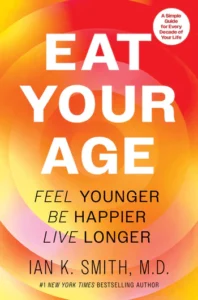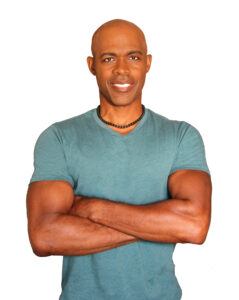EAT YOUR AGE by Ian K. Smith, M.D. (Book Excerpt)
 Defy Age
Defy Age
For hundreds of years, there have been fabulous stories of rulers and explorers looking for the fountain of youth—magical water that could bestow the restorative powers of youthful vigor to those who drank or bathed in it. It has been rumored that Alexander the Great encountered a healing “river of paradise” in the fourth century BCE. But this legend is not the only one. From Japan to England to the Canary Islands, mythical tales of magical healing and miracles were rampant. Despite the tremendous effort put forth and the power of those commissioning this enviable search for infinite youth, success was elusive. That was then, and this is now. Maybe the intentions of their search weren’t as misguided as the locations they were searching and the form in which they were expecting to find this source of abundant youth.
Today, there are numerous stories of people who have found some form of that youthful fountain. It wasn’t the water they drank or the river they swam in, rather it was what they ate, how they moved, and their philosophical approach to life. The headlines and viral video clips populate the media. “75-year-old Charles Allie Goes Sub-14 in the 100m at Penn Relays.” “World’s Oldest Female Bodybuilder, 86, Can Still Bench 50kg and Lives Off Nuts and Eggs.” “World’s Oldest Ironman Plans to Keep Competing into His 90s.” The subjects of these headlines, Charlie Allie, Ernestine Shepherd, and Hiromu Inada are the living embodiments of defying age. They, along with many other older competitors, have amazed the world with their physical performances, conquering challenges that adults a quarter their age have not even tried, let alone succeeded in doing. Instantly, reading their stories and watching their videos makes you wonder aloud, “How is this even possible?” But it also begs the question, are these exceedingly rare accomplishments and performances a signal that the fountain of youth has finally been found? The answer will vary based on what definition you decide to use.
It’s extremely unlikely without some revolutionary scientific achievement that humans will be able to live for hundreds of years and enjoy almost eternal youth. But maybe the scaled-back version of this is what we’re seeing with the previously mentioned athletes as well as the scores of centenarians around the world who are not just reaching ages that were once thought unachievable but are also maintaining a relatively good quality of life and participating in vigorous activities.
Our perception of aging typically centers around gray hair, wrinkled, sagging skin, hunched shoulders, curved spine, shuffling gait, and emaciated extremities. We think of older people sitting and chatting on a park bench, being pushed in a wheelchair to a doctor’s appointment, or walking cautiously with a cane as others pass them by. We don’t think about people in their 80s racing, participating in bodybuilding competitions, or conquering an IRONMAN triathlon that consists of a 2.4-mile swim, 112-mile bicycle ride, and 26.2-mile run. This traditional thinking that aging automatically means a dramatic change in appearance and steep decline in function can and should be changed by taking small, early steps that can keep you feeling and looking young longer.
If you want to know how to grow old without feeling old, why not learn from those who have done it? National Geographic Fellow Dan Buettner along with Michel Poulain and Giovanni Mario Pes have done extensive and highly informative research in this field. They studied regions all over the world called Blue Zones that produce the most centenarians and focused on the specific aspects of their lifestyle and their living environments that contributed to their longevity. Their research, along with that conducted by others, has created a treasure trove of information that can be instructive for those looking for the modern version of the fountain of youth.
This entire book is dedicated to helping you find ways to prevent, combat, and slow the typical physical, mental, and spiritual decline of aging. I’ll provide specifics on how this is done in the coming chapters, but below you will find the general strategic framework of 15 things that you can implement in your life at any age to immediately start turning back the clock—or at least prevent it from running out too quickly.
Ingredients for a Recipe to Glorious Aging
- Find purpose.
- Stay hydrated.
- Cut back on salt.
- Protect your skin.
- Exercise your heart.
- Limit alcohol.
- Sleep long and deeply.
- Exercise your brain.
- Visit your dentist.
- Eat more plants, less meat.
- Stress less.
- Find your community.
- Increase vitamin C intake.
- Gorge on antioxidants.
- Fill up on fermented foods.
Find purpose. Living just to be living and doing just to be doing might get you through the day or week or month, but it won’t serve you in the long run. Having purpose, whatever that might mean to you, gives you focus and creates intentionality in what you do. Having a definable “why” is something that many people who live long and well have in common. There is no fixed list of what “whys” are most effective. This is something that’s organic and you must own. Ask yourself why you’re getting out of bed every morning, and if your answer is not one of fulfillment or that generates a sense of usefulness, then it’s time to think harder about your direction. Researchers have long expounded that purposeful living—whether it be increasing social activity, reducing stress, or treating depression—can be the spark for good health and longevity. Find what it is in life that makes it all worth it and cling to it tightly, holding it up as your North Star.
 IAN K. SMITH, M.D., is the #1 New York Times bestselling author of The Met Flex Diet, Shred: The Revolutionary Diet, Super Shred: The Big Results Diet, Fast Burn!, Blast the Sugar Out!, The Clean 20, and twenty other books, including the award-winning series of Ashe Cayne mystery novels, with millions of copies in print. The creator and founder of national health initiatives including The Makeover Mile, he was a longtime medical contributor to The Rachael Ray Show and host of the nationally syndicated, Emmy Award-winning The Doctors. A graduate of Harvard College, Columbia University, and the University of Chicago Pritzker School of Medicine, he has served on the boards of the American Council on Exercise, the New York Mission Society, the Prevent Cancer Foundation, The New York Council for the Humanities, and The Maya Angelou Center for Health Equity. Visit Eat Your Age – HarperCollins.
IAN K. SMITH, M.D., is the #1 New York Times bestselling author of The Met Flex Diet, Shred: The Revolutionary Diet, Super Shred: The Big Results Diet, Fast Burn!, Blast the Sugar Out!, The Clean 20, and twenty other books, including the award-winning series of Ashe Cayne mystery novels, with millions of copies in print. The creator and founder of national health initiatives including The Makeover Mile, he was a longtime medical contributor to The Rachael Ray Show and host of the nationally syndicated, Emmy Award-winning The Doctors. A graduate of Harvard College, Columbia University, and the University of Chicago Pritzker School of Medicine, he has served on the boards of the American Council on Exercise, the New York Mission Society, the Prevent Cancer Foundation, The New York Council for the Humanities, and The Maya Angelou Center for Health Equity. Visit Eat Your Age – HarperCollins.
Tags: dr. ian smith















